What Does Burning Wires Smell Like? (Detection, Cause, Safety)
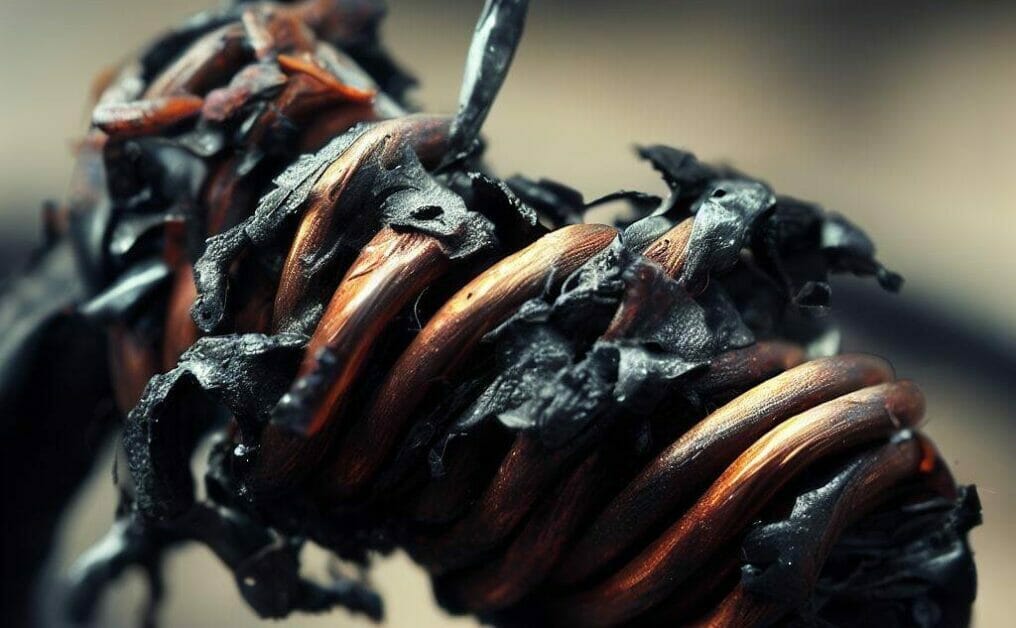
Ever caught a whiff of something foul and thought, “Gee, that smells like burning wires?” Well, you’re not alone! I’ve wrinkled my nose more than once at that distinctive scent. It’s a smell you can’t quite shake off.
So, what exactly does it smell like? Burning wires have this acrid odor, often compared to burnt rubber or rotten eggs. It’s sharp, unpleasant, and potentially harmful if inhaled too long.
By the time we’re through this article, you’ll be able to sniff out the problem like a bloodhound on a trail! We will dive into what causes this peculiar aroma and how it affects your health and home.
Recognizing the Burning Wires Smell
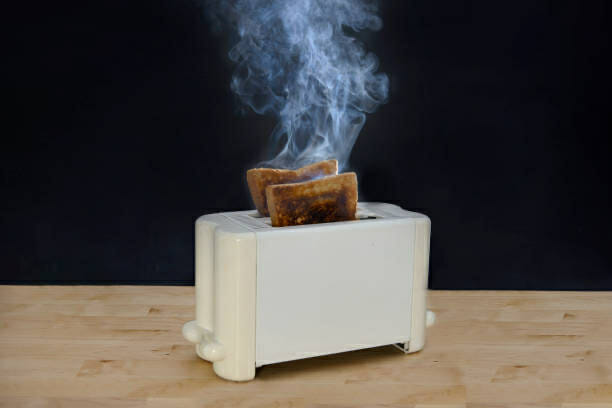
If I were to describe it, I’d say it’s distinctly acrid and metallic. It’s like burnt toast but with a harsher, more piercing note that doesn’t sit right.
When electrical wiring gets too hot, the insulation around the wire can melt or burn, resulting in that odor. It’s similar to plastic burning – think about leaving a plastic spatula too close to your stove’s burner and getting distracted (we’ve all been there!). You’ll notice an awful stench filling your kitchen before you realize what happened.
But here’s the real kicker – unlike other smells that gradually dissipate over time, this one lingers for quite a while. Even after disconnecting the power and allowing everything to cool down, that funky smell might still be in the air.
Here are some quick tips on recognizing this critical aroma:
- Have an active nose: Don’t ignore strange smells; they could be signs of something serious.
- Remember, it smells acrid(strong, sharp, and harsh) and metallic, much stronger than burnt food.
- Remember that this one tends to stick around longer, unlike ordinary scents.
So always keep those nostrils alert! After all, quickly identifying the smell could help prevent significant electrical damage or fire hazards in your home.
Causes Behind the Unmistakable Aroma of Burning Wires
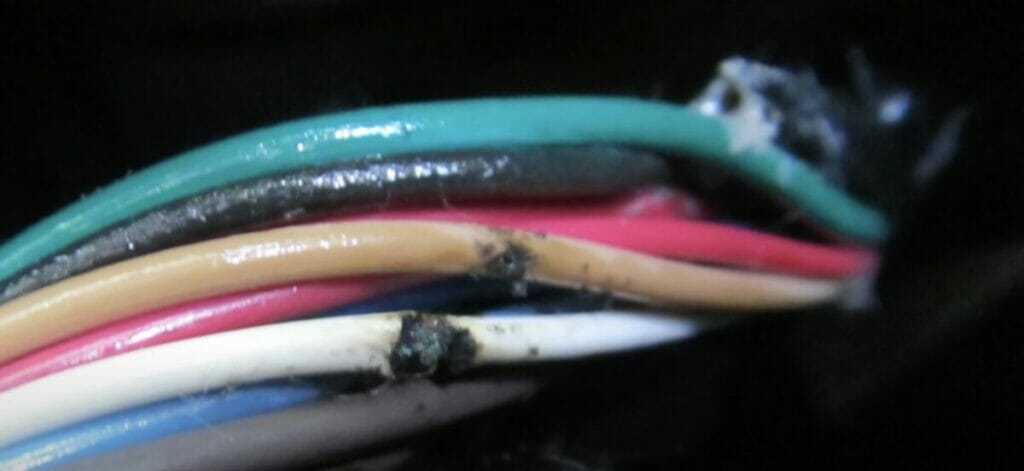
Well, the primary culprit here is insulation. Most electrical wires are coated in a layer of plastic insulation. This coating protects us from the electricity traveling through the wires. But when things go awry, and these wires heat up too much, we get our infamous burning wire smell.
That said, different plastics create different smells when they burn – some might remind you of charred wood, while others reek more like chemicals.
Now hang on tight! Here’s a list breaking down some major types of wire insulation:
- PVC (Polyvinyl Chloride): Commonly found in household wiring, it gives off a harsh chemical smell when burned.
- PE (Polyethylene): Used mainly in communication cables like ethernet or telephone lines. When this burns, expect a waxy odor.
- PTFE (Polytetrafluoroethylene): Known as Teflon® in your kitchenware but also used for high-performance wiring, it emits a sweetish acrid scent if it gets hot enough to degrade.
But don’t be fooled into thinking only the insulation affects how burnt wires smell! The metal inside—often copper or aluminum—can contribute its aroma to this unpleasant mix once things heat up.
Dangers Associated with a Burning Wire Odor
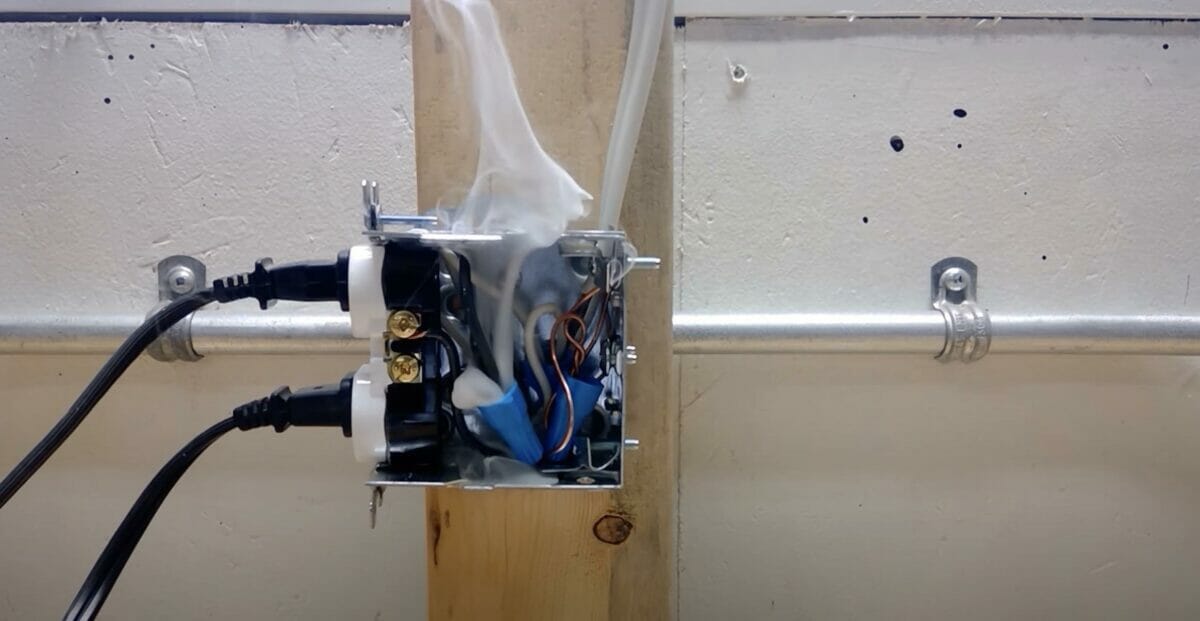
The smell could mean an electrical fire brewing somewhere behind the scenes. Overheated wires emit that distinct odor when their insulation starts to burn off. If not dealt with promptly, this could lead to an all-out house fire.
Don’t panic just yet! Remember, knowledge is power. Knowing the risks associated with a burning wire smell can help you prevent disaster.
- Electrical fires: This is the big one, folks! Did you know that according to the U.S Fire Administration (USFA), electrical malfunctions cause about 6.3% of residential fires yearly?
- Toxic fumes: When wire insulation burns off, it releases toxic gases into your home’s air. Breathing these in isn’t exactly what I’d call healthy!
Here’s a little table summarizing those stats:
| Risk Factor | Details |
|---|---|
| Electrical Fires | Cause roughly 6.3% of residential fires yearly |
| Toxic Fumes | Released from burnt-off wire insulation |
Now let’s talk about how this might affect your health over time:
- Respiratory problems: Prolonged exposure to toxic fumes from burning wires can lead to respiratory issues like bronchitis or asthma.
- Headaches & nausea: Breathing in these harmful gases may also give you headaches or make you feel nauseous.
So folks, if you ever catch that distinct burning wire smell lingering around your home – act fast! It might save your life and protect your family’s health, too!
Immediate Steps to Take if You Smell Burning Wires
Yikes! If you smell that distinctive burning wires scent, it’s time to act fast. This isn’t an aroma you can ignore – it could indicate a serious electrical problem and pose a fire risk.
First things first, safety is paramount. If the smell is strong and accompanied by smoke, get everyone out of the house immediately and call 911. Fires caused by electrical faults can spread rapidly and are extremely dangerous.
However, if there’s no visible smoke or sparks but that burning wire smell is still lingering in the air, switch off your main power supply at the breaker panel ASAP. That’ll cut the current flow and hopefully stop any further damage from happening.
Once it’s safe to do so (which might mean waiting for your local fire department to give you the all-clear), identify which appliance or area could be causing that burnt wire stench.
Here are some possible culprits:
- Old or damaged wiring
- Overloaded circuits
- Faulty appliances
- Out-of-date breaker panels
In all honesty, though, unless you’re an electrician, figuring out what’s wrong isn’t something I’d recommend trying on your own. It’s best to play it safe and call in a professional as soon as possible.
Remember, folks: we can’t afford to take chances regarding electricity!
The key takeaway here? Don’t delay if you notice a burning wire smell in your home. Safety should always come first – even if it means turning off the power until help arrives!
Prevention: How to Avoid the Burnt Wire Smell in Your Home or Office
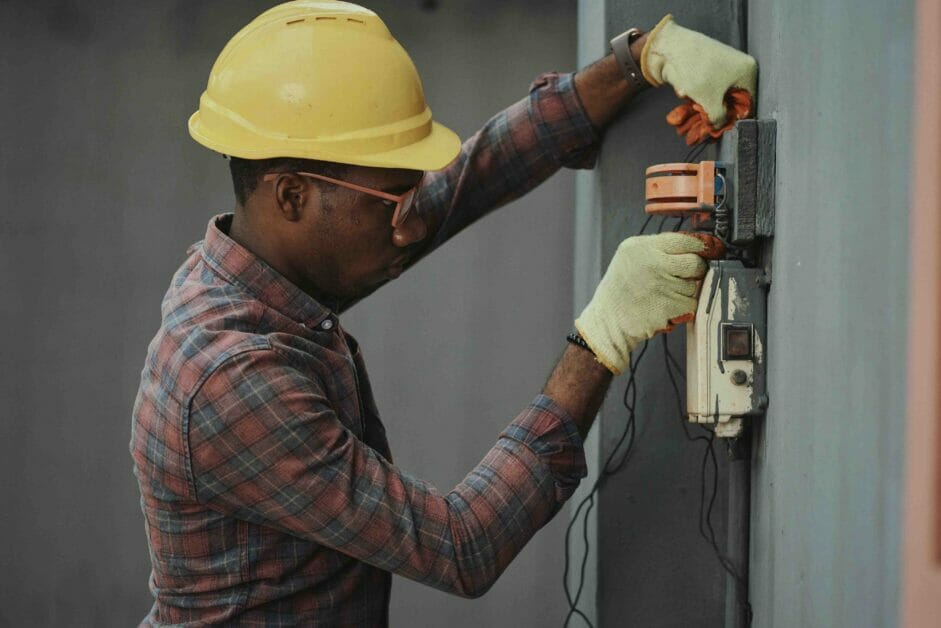
Man, I have to tell you, no one likes that nasty burnt wire smell. It’s plain unsettling and can be a real sign of trouble. So how do we avoid it? Let’s dive in.
Regular Inspection: Check out home or office appliances, outlets, and circuit breakers. Don’t hesitate to call a professional electrician if something looks dicey or out of place. Better safe than sorry!
Never Overload Your Circuits: We’re all guilty of plugging too many gadgets into one outlet at some point, but seriously, folks – it’s not worth the risk. Overloading can cause wires to heat up, and poof, there goes that burnt smell again!
High-quality Electrical Equipment: Cheap stuff might save you money initially, but it’ll cost you more if it fails or catches fire.
Proper Ventilation: Many people forget this step, but ensuring your devices are well-ventilated helps prevent overheating – a major cause of that dreadful burnt wire smell.
Here are some handy tips for keeping everything cool:
- Keep electronics away from direct sunlight.
- Don’t stack gadgets on top of each other.
- Clean dust off regularly – dust build-up can trap heat!
Wire Protection: Let’s not forget about protecting our wiring from pests like mice and rats who love gnawing on them (yeah, gross!). Ensure any holes in walls or floors where these critters could enter are sealed up tight!
Common Appliances That Could Be Causing the Burnt Wire Scent

So, you’ve been noticing a scent that reminds you of burning wires in your home? It may be coming from one of your everyday appliances. Let me tell you about a few typical culprits.
Space heaters
Space heaters are notorious for producing this smell. When they’re overloaded or have worn-out wiring, they can give off an unpleasant odor similar to burnt wires. It’s crucial to check them regularly and ensure they’re in good working condition.
Hair Dryers
Next up on our list are hair dryers. Even these gadgets can be responsible for the strange smell wafting around your bathroom. The internal wiring can overheat due to prolonged use or if dust builds up inside.
Microwaves
Thirdly, we have microwaves. These kitchen staples are often overlooked when it comes to maintenance but trust me, they’re just as prone to wire-burning smells as any other appliance! If yours is running hot or used excessively without proper cleaning and ventilation, it might emit that burnt wire scent.
Air Conditioning Units
Last but not least are our trusty air conditioning units. Especially during those sweltering summer months when they’re constantly chugging along, keeping us cool — AC units can strain their electrical components, causing them to heat up and potentially burn out.
Remember folks;
- Regular checks on all appliances
- Quick action at the first sign of trouble
- Keeping appliances clean is a simple step that can help prevent these odors and ensure a safe environment for everyone in your house!
And hey – if you ever catch a whiff of something that smells like burning wires – don’t ignore it! It could be an early warning sign of potential fire hazards lurking within your beloved home gadgets!
I hope you found this article enlightening! Whether you’re an aspiring electrician or just curious about home safety, knowing about the phenomenon of burning wires can come in handy. Stay informed and stay safe out there! Until next time!
References
Organizations:
- U.S. Fire Administration (USFA). https://www.usfa.fema.gov/
- National Fire Protection Association (NFPA). http://www.nfpa.org/
- Occupational Safety and Health Administration (OSHA). https://www.osha.gov/
Books:
- “The Complete Idiot’s Guide to Electrical Repair” by Terry Meany.
- “Wiring a House” by Rex Cauldwell.
Website Resources:
- Consumer Product Safety Commission (CPSC). https://www.cpsc.gov/
- Electrical Safety Foundation International (ESFI). https://www.esfi.org/
- WebMD. https://www.webmd.com/
- Mayo Clinic. https://www.mayoclinic.org/
Video References:
Power Probe USA
Andrew Payce
